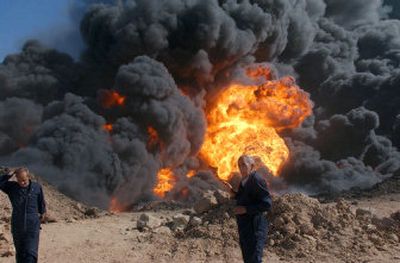Iraqi oil output decreases

BAGHDAD, Iraq – Iraqi oil production fell by 8 percent last year, with a sharp decline near year’s end that left average daily production at half the 3 million barrels envisioned by U.S. officials at the outset of the war in 2003.
Prospects for improvement this year are slim, according to many experts, calling into question Iraq’s ability to support itself and fund reconstruction efforts as U.S. assistance is scaled back. Reasons for the shortfall include the poor state of the nation’s oil fields, a creaky infrastructure, poor management and ongoing insurgent attacks, particularly to pipelines in the north-central region meant to export oil through Turkey.
“There is no instant turnaround,” said Paul Horsnell, energy analyst with Barclay Capital in London. “It could take five years, six years or seven years.” As of last month, Iraq was pumping a million barrels a day less than just before Saddam Hussein was toppled from power in the U.S.-led invasion of Iraq.
In helping sell the war, Bush administration officials had predicted that a strong Iraqi oil industry could help pay for the nation’s postwar recovery. To prime the effort, the U.S. Congress voted on a three-year, $20.9 billion reconstruction package, of which about $2 billion was dedicated to restoring Iraqi oil production.
Instead of steadily increasing production, the annual output fell in 2005 to 1.83 million barrels a day, including a sharp decline over the final quarter capped by a December dip to 1.57 million barrels daily.
The latest production figures from the International Energy Agency compare with the 2.5 million barrels per day the Iraqi industry was pumping just before the war, a level it nearly equaled in March and April of 2004. Officials said December’s figures were influenced by bad weather and a scarcity of tugboats at Persian Gulf marine terminals, in addition to the continuing violence, and poor facilities and management.
Oil revenues contribute 94 percent of the fledgling government’s budget, and a drop in oil global prices from current high levels could wreak havoc if output remains depressed. Financial stress was evident last week when Turkey suspended shipments of gasoline and other fuels to Iraq, saying its refiners were owed $1 billion. Although Iraqi officials said the nonpayment was due to a short-term budget shortfall, it serves as an example of how stretched this country’s finances are.
The most serious and pressing problem is the lack of adequate security, according to Gal Luft, executive director of the Institute for the Analysis of Global Security in Washington.